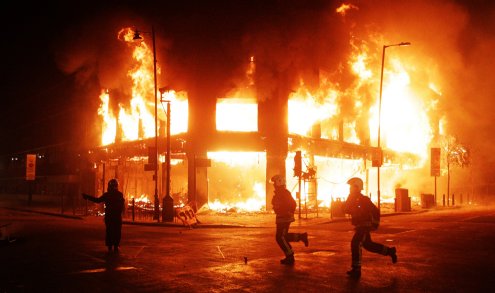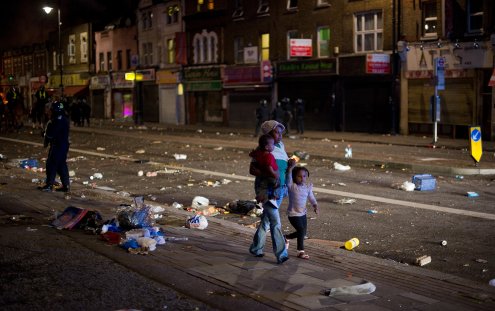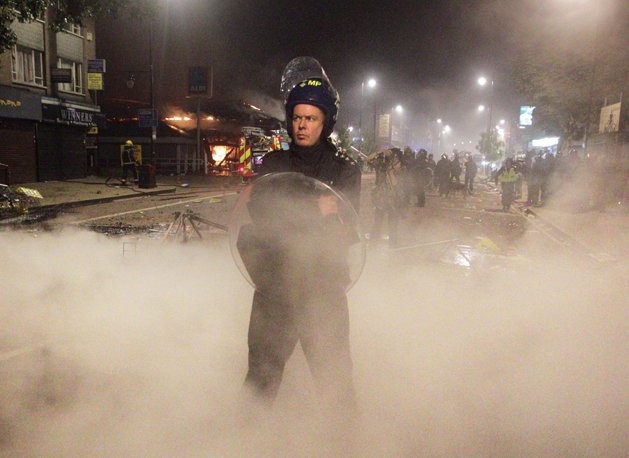London Burning
I happened to visit London for the first time only a few months ago. While there, I visited friends living in Tottenham, only blocks from the recent outbreaks of rioting and looting.

Fire fighters and riot police survey the area as fire rages through a building in Tottenham, north London on Aug. 7, 2011. A demonstration against the death of a local man turned violent and cars and shops were set ablaze. (Lewis Whyld/PA/AP)
It’s alarming to think the bustling streets, filled with families going about their business and small shops serving a plethora of wares, have been replaced by broken glass, burning police cars and hooded youths hurling bricks and looting stores.
Many have sought the roots of the London riots, often citing the police shooting of Mark Duggan. But it would be naive to think the current spate of rioting and looting, taking place across London, is entirely fuelled by outrage at a perceived case of injustice.
At the root of the London riots is a deep disaffection by many youths, a disconnection from their communities and the broader society, and a lowering of social norms that would inhibit such wildly destructive behaviour.
And it’s likewise naive to think that police action alone can contain this outbreak, or that the threat of further police action can prevent it from happening again.
The limits of the law
In any modern democratic society, the police are necessarily vastly outnumbered by the people. Should the people decide, as one, to rise up against the police or against the state, there’s little the police can do to stop it. (I should add that I’m referring to modern democratic societies governed by the rule of law, not autocratic pseudo-dictatorial democracies like Syria.)
This means it’s a curious fact that most people continue to obey the law – such as by not looting when they believe they could get away with it – not because they feel a constant threat of judicial retribution, but because they simply don’t believe that such anti-social behaviour is permissible or desirable.
This is the power of social norms. They are, in fact, far more potent at directing social behaviour than legal norms. The problem is, adherence to social norms requires individuals to identify with the community that shares them.
I strongly doubt that these youths would loot shops run by their family, or even their neighbours. Doing so would be perceived as hurting themselves.
However, for youths who don’t identify with the broader society, or with their local communities, the rest of the world becomes their out-group. And the out-group and its interests and social norms don’t count for much, particularly when there’s pack behaviour making things like looting seem more permissible.
Thus, the absence of in-group identification with the society/community, along with the lack of threat of retribution by the police given the scale of the outbreak, plus social and economic inequality, equals a tinderbox. One spark – like a police shooting – and rioting and looting can run amok.
Turning the tide
How to turn the tide back again? In the short term policing will need to increase, if only to lock things down and restore order to the streets. But this can only be a short term solution. One never wants the police to have more powers than are absolutely necessary to enable social forces to take over in regulating behaviour.
The next step is a long term rebuilding of community and social ties. That’s a lot harder. It means engaging with all elements in society, providing opportunities, education and jobs. It means providing support networks to prevent some from ‘falling through the cracks’ and dissociating themselves from the broader society. It means getting people engaged in their communities, feeling like they’re on the inside not the outside.
Government can play a role in facilitating these things, as well as by fiddling the economy to prevent the worst aspects of inequality from entrenching disadvantage. But ultimately it’s up to the community to do the real long-term work.
This stuff isn’t easy, particularly in fragmented multicultural societies with high immigration, as people all-too-easily cluster together in their cultural or ethnic enclaves and cease to identify with the broader society. But this stuff is fundamental to a healthy modern democratic society.
Complex problems demand sophisticated solutions

A woman walks through the debris with two children as riot police try to contain a large group of people on a main road in Tottenham on August 6 2011. (Leon Neal/AFP/Getty Images)
It’s possibly the most profound weakness of contemporary conservative political ideology in the UK, the US and here in Australia to discount the importance of socio-economic disadvantage and inequality on causing social disruption, and a corresponding over-reliance on policing to ensure social harmony.
Conservatism might actually work if we really were a society of autonomous individuals, motivated entirely by incentives. But society is greater than the sum of the individuals that make it up.
Economic intervention by governments, progressive taxation, an inheritance tax, regulation, education programmes, jobs programmes, welfare and social safety nets are about more than wealth redistribution from the hard workers to the bludgers. It’s about facilitating the weaving of a social fabric.
I think it could be no accident that these riots occur with greater frequency after conservative policies are enacted.
But this post is not to demonise conservatism, it’s to suggest the causes of these riots are complex, and the solution need be equally sophisticated – and, ultimately, rooted in strengthening the communities themselves.
It’s only once community bonds and social norms re-exert their authority that harmony can be restored to London. And that’s a lesson other modern democratic societies would do well to learn – preferably before a single brick is thrown; a single small business looted.

2 Comments
Paul · 11th August 2011 at 12:32 am
Great post, definitely more insightful about the causes for the looting than most other stuff I’ve read. Although I would add that U.S. conservativism isn’t just about laisez-faire government policy, but also about using the power of the government to enforce conservative social norms. Do not forget Bush II’s
“compassionate conservatism” was an attempt to reconcile the consistent desire of the U.S. electorate for some version of a welfare state with the goals of religious conservatives.
The Ethical Project: Measuring Ethical Progress « Ockham's Beard · 27th January 2012 at 4:38 pm
[…] Then you get to modern day liberal society. In Australia, for example, there are a little over 200 police officers per 100,000 citizens. That’s some ratio: 1 police officer per 500 people, to be exact. Should those 100,000 citizens spontaneously decide to begin ‘defecting’ (lying, cheating, robbing, harming etc), there’s little the 200 police officers could do – a phenomenon observed recently during the London riots. […]